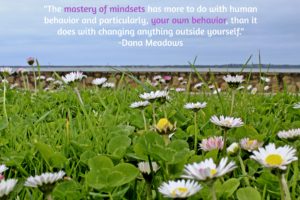The best way to listen to this audio recording is to download it via this link.

According to the Gustavus Adolphus College Archives, “this presentation by Donella H. Meadows was given at the 1993 Nobel Conference on the campus of Gustavus Adolphus College. The theme of the 29th annual conference was Nature Out of Balance: The New Ecology. Meadows was an American environmental scientist, teacher, and writer. She wrote The Limits to Growth and Thinking in Systems: a Primer. Meadows was the Nobel dinner speaker, and her presentation served as a summary of and closure to the conference.”
With a Nature Out of Balance thematic, Meadows asks the audience to consider why we think of ourselves as constant and static, whereas the world around us is considered to be changing and evolving.
She poses the question, “Why is it so hard for us to see turbulence, variation, emergence, evolution? And so easy for us to see machine-like, harmonic, orderly ways, things, in front of our eyes whether that’s a plate-tectonic shift, or a species, or a stock market change?” Depending on the tools available to us, we answer this question differently. Meadows suggests that systems thinkers are equipped with the tools to holistically view questions such as this.
Meadows also expresses a sentiment that still rings true today: “People only see and know the world through models…we only know mindsets, worldviews, models, and assumptions… we don’t know the world. In our heads is not the world. It’s an abstraction of the world, it’s a simplification of the world, it could be an extremely sophisticated one based on a lot of experience of the world, but we don’t know the world. We have to have models for our own sanity, we have to have assumptions about, basic, deep assumptions, about how the world is.”
As a result, Meadows calls us to see things differently. When Limits to Growth was published, Meadows shared that people attacked the ideas within the model. She thinks that people felt as though Limits to Growth threatened their worldview, their mindset. Being challenged in such a way causes a paradigm shift, the evolution of ideas and thoughts.
My favorite piece of Dana wisdom offered in this presentation was her viewpoint on mindsets. She stated, “the mastery of mindsets has more to do with human behavior and particularly, your own behavior, than it does with changing anything outside yourself.” We have to learn how to think, question our own mindset, and question the conflicting mindsets or worldviews of people we meet. In her presentation, Dana said that we need to understand how much we need each other. As Dana advises us to recognize our need for one another, I am reminded of her thoughts on community. She unfailingly advocated for humans to lift up and support one another. In this presentation, I think that Dana is even more urgent and passionate in expressing this idea. Not only should we be with one another, but we need to be.
Warmly, MS







